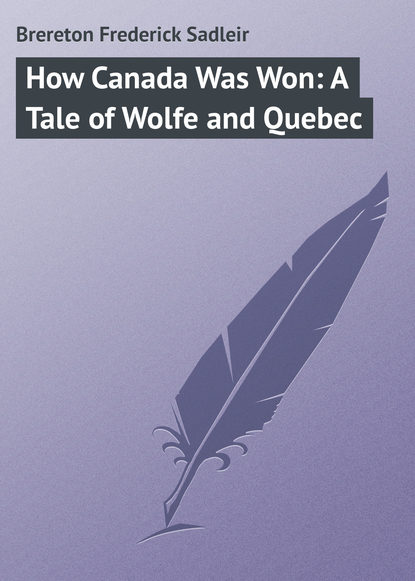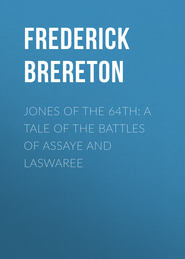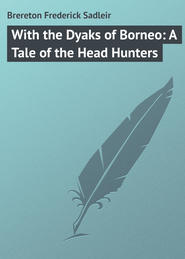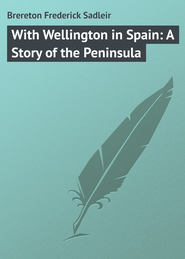По всем вопросам обращайтесь на: info@litportal.ru
(©) 2003-2024.
✖
How Canada Was Won: A Tale of Wolfe and Quebec
Настройки чтения
Размер шрифта
Высота строк
Поля
"You are a strange person, monsieur," he said with a grin of satisfaction. "You are ill and in great pain at one moment, and then, behold! after a little sleep you are well again and wish to eat and to walk."
"You forget. There was the warm milk, and Jean gave it to me," smiled Steve. "But I am hard. I have roughed it in the forests ever since I was a little fellow, and have had very little illness."
He sat down at the table and ate a hearty meal. Then he lit his pipe and strolled into the courtyard, passing a few words with the sentries.
"He is a fine young fellow, this monsieur," said one, to his comrade, when Steve had passed on. "If all are like him we shall have but a poor chance. Jacques, can you tell me why it is that our prisoner has never attempted an escape?"
"Perhaps he is afraid, comrade. Men have been shot for that in the last few months."
"Afraid! Not he!" came the answer. "It is this way, Jacques. Monsieur is a man of honour, though he is only a youngster. He has been on parole up till lately, and that is why he has made no attempt. As to why he does not go now, well, I will give you the reason. He is no fool, comrade. Understand that. He is no fool, I say, for he knows that the sentries here are old soldiers and keep a good watch. Besides, could a cat escape from this place, and if it did, where is it to go? Nowhere! Unless a prisoner is tired of life and throws himself into the river. That would be better than to be butchered by the red villains whom we have hanging about the place. Tobacco, Jacques? Help yourself, but be gentle, please, for I have but my slender pay and allowances, and a smoke is a luxury."
They stood together chatting for a while, and then separated to patrol the courtyard, passing Steve on each occasion and noticing that he was walking up and down rapidly, as was often his custom.
"Vraiment! These English make me smile," laughed one of the men, as he met his comrade opposite the guard-house. "One would think that monsieur earned his rations by walking this place. Now, if I were he – "
"You would draw the rations first and sleep, leaving another to do the walking," was the laughing answer. "Peste take these English. It is because they are so energetic that they still keep up their opposition. Others would have given in long ago after suffering so many defeats."
They stood together chatting for a time, their talk turning upon the surrender of Fort William Henry and the massacre which followed. Then they shook their heads and agreed that such a catastrophe would have ruined their own cause, while, strangely enough, it had made the enemy even more determined.
And while they chatted Steve gradually approached the wall, and finally halted at the spot where Silver Fox had given his signal. It was absolutely dark down below, and though he peered into the black shadows, even his trained eyes failed to see any object. He was in the act of withdrawing his head when there was a movement below, and the faint bark of a dog. Then someone whispered.
"Steve? Is that you, lad? Then catch this tackle."
Something swished in the air, a bright object shot up from the black abyss, and the prisoner gripped an iron hook, to which a stout rope was attached. To place the hook in position was the work of a second, and within a minute he was down at the bottom of the wall, with his hand gripped firmly in that of his father.
"Come. They will discover that you are gone in a very few seconds perhaps, and then there will be a noise. Ah! The sentries are calling."
Steve clutched at his father's sleeve, and allowed himself to be led away through the darkness. They ran along the narrow path, darted out into one of the roads which ascend the cliff, and soon afterwards were making their way along another path.
"They're at it! Listen to 'em shoutin'."
Steve suddenly heard a well-remembered voice speaking a foot or two behind him, and with a gasp of surprise realised that Hunting Jim was one of the party. But he had no time to greet him, and, indeed, little opportunity of doing so, for Judge Mainwaring hurried him on at a rapid pace, shouts from the fort having plainly shown them that the escape was already discovered. In fact, the sentries who had been so eagerly discussing the English nation and their idiotic absurdities, as they were pleased to call several of their customs, were smart fellows, in spite of all their chatter. Steve had been gone less than a minute when one of the men became suspicious.
"Ma foi, but I believe this monsieur has given us the slip already," he suddenly exclaimed. "I cannot see him. Jacques, get along and report if he is there."
The last-named ran along the courtyard, and presently his voice was heard. "He is nowhere to be seen," he cried. "Had we not better fire so as to give the alarm?"
"Fire! And so wake the whole garrison! Not for worlds. Get across to monsieur's quarters, and report if he is there. It is possible that he entered while our backs were turned."
It was not long ere the sentry returned with the news that Steve's room was empty, and then, indeed, the alarm was sounded. The sentries shouted to the sergeant of the guard, and the sergeant, having promptly turned his guard out and interrogated the sentries, roused the officer in command of the fort. A cannon was then fired, a signal agreed upon beforehand to mean that a prisoner had escaped, and very soon the garrison was acquainted of the fact.
"Now to the left," whispered Steve's father when they had run the better part of a mile and were on the outskirts of the city. "That is excellent. We are now on the plains of Abraham, and in a little while should be in safety."
Breaking into a fast walk, the fugitives kept straight ahead for another mile, till they came to a dip in the ground. There was the reflection of a fire hanging over the dip, and presently Steve caught sight of a native wigwam of large proportions. His father gave a cry of delight, and in a few seconds they were all inside. A smothered greeting welcomed them, and at once Steve was gripping the many hands held out to him, for there were now seven persons crowded into the wigwam, and a lantern which hung to one of the roof poles shone on their painted faces, and enabled the rescued prisoner to see them. Not that he easily recognised these friends, for they were all heavily daubed with paint and decked out in all the feathers and finery of the Huron Indians. However, he was sure of his father, the huge, raw-boned chief who stood beside him, holding him affectionately by the shoulder, for the voice betrayed him at once. But for that, Steve would have passed him by without recognition, for the Judge had shaved his beard, and now presented a smooth face, than which there was none more noticeable for the power and reserve which it expressed.
"You ain't forgot me, Cap'n, I hope," burst in one of the men, painted hideously to represent a fox. "You ain't quite forgot Pete, as took up quarters with yer 'way back thar down by Lake St. George."
"Nor me, if ye plaze, Masther Steve, Cap'n, beggin' yer honour's pardon," said someone else, pushing to the front and holding out a huge paw, which was painted now, but which at other times was freckled and tanned to a colour that matched that of an Indian. It was Mac, a grin stretching from ear to ear, clean shaven, and with his brilliant locks cut back to form the conventional scalp lock of the Hurons, and dyed; yes, Mac boasted hair of the blackest jet now, and but for his speech, his huge grin, and his squat, powerful figure, was quite unrecognisable.
"You've took the Cap'n aback," cried Jim, pushing Mac aside. "It ain't likely as he'd recognise an old pal in a beauty sich as you air. Why, Mac, you was never so good-lookin' in all yer life before, and ef you'll take a bit of advice from me, why, you'll stick where yer air. Jest take to bein' a brave for the rest of yer natural existence."
That brought a still wider grin to the broad face before Steve, a grin which seemed to sever it into two complete portions, and which showed a most excellent set of teeth.
"Bad scran to ye now, Huntin' Jim, ef I don't take ye by the neck this instant and scalp ye. 'Tis yerself that's uncommon handsome to-day. Stand up and let the Cap'n see ye."
He retired into the background, and gave Steve an opportunity of setting eyes on the tall trapper who had been such a staunch friend. He, too, was decked as an Indian, and in his case the disguise was perhaps even more natural than in that of the others. For Jim was tall and wiry. He was trained by constant wanderings in the forest to the very last ounce, and his muscles, though small and not of Mac's proportions, stood out like whipcord. Then, too, his sharp and intelligent features helped in the deception, while the habits which this old hunter had learned in the fifty years of his busy life had given him that imperturbable look common to the Indians.
"You was never so surprised in all yer life, Cap'n, I reckon," he said. "You was mighty sick of roostin' up there in the fort, and no doubt thinkin' of having a turn for liberty yerself. Then Silver Fox come into the fort, and I'll bet what yer like that he walked about as ef he'd been thar many a time, and as ef he wasn't on no account to be hurried. He's that cool, he's like an icicle."
"He is a gallant fellow, and I thank him. Chief, I owe a lot to you as well as to these other friends. But who is the stranger?"
A tall Indian had stood in the background looking on at the scene with a half-suppressed air of contempt on his finely chiselled features, for your Indian could not understand the need for such warmth and such hand-shakings over a meeting. Silver Fox beckoned to him.
"This is my brother, Hawk," he said, "this is Flying Bird, a Mohawk once, and later a Huron. He is now again one of our tribe."
"And thereby hangs the tale of your release, my boy," broke in Mr. Mainwaring. "The story is soon told. This Flying Bird was born in the same wigwam as our old friend Silver Fox, and would have been there to this day had not the village been raided. The Hurons made a sudden descent, and Flying Bird was carried away. He was then seventeen, and almost a brave. He was spared, and became one of the Hurons, marrying into the tribe. Now he has lost his wife, and taking advantage of the fact that the Hurons were marching into the country adjacent to that in which the Mohawks lived, he made a journey to find Silver Fox. He came in the nick of time. I had just returned to find you a prisoner, and the band of scouts which you had formed near Fort William Henry about to be disbanded. They had been fortunate in escaping from the fort before the surrender, and of course there was little left for them to do.
"Well, we made plans to meet again at the breaking of the winter, and two months ago we gathered at Silver Fox's village. His brother had returned to Canada for the cold months, so as to allay suspicion, and we fell in with him ten days ago south of the St. Lawrence. As to how we reached that part, why, the movements of our troops are beginning to worry the French, and they are concentrating at the threatened places, leaving the upper reaches of the Richelieu and the country to the west of that river almost denuded of trappers and Indians. We slipped through, and – "
"And here you are, father. What is the next move?"
"We wait here for a week perhaps, till the hue and cry for you is over. Then we take to the river, capture some sort of craft, and sail for Nova Scotia."
Everything had, in fact, been carefully mapped out, and so far the plans of the rescue party had gone without a hitch. But there was a great deal still to be done, and many dangers would have to be faced before Steve and his friends could hope to reach safety again. However, they were not the men to flinch at the thought of danger. Indeed, they rather enjoyed the prospect and the novelty of their present position, and on the following morning eagerly scanned the city and its neighbourhood for signs of searchers.
"Fortunately for us they have very few Indians at their beck and call just now," said Mr. Mainwaring, "for they have sent them down to Ticonderoga and to the country about Louisbourg. There are a few lazy fellows still remaining, the ne'er-do-wells of the various tribes, and there is of course this small party of Hurons."
He smiled at Steve, and proceeded.
"You see, there was need for a party to lie close to Quebec, for it would have been impossible to spirit you away from the city in the few hours we had at our disposal. You will see why shortly, for the river will swarm with canoes, and what Indians there are will be sent off in search of your tracks. We had to have some arrangement whereby we could take up our quarters near the city, and Jim settled the matter very quickly."
"Thar warn't nothin' in it," growled the trapper. "We wanted to lie up here, and Flyin' Bird gave us the word that all the redskin varmint was off to other parts. Waal, Cap'n, we fixed it up that we should be a kind of deputation of Injuns from the Huron tribe come back to complain of the favouritism shown to other redskins. That air a likely tale, for these braves air always rowin' among theirselves. Flyin' Bird's seen the commandant, they've had a palaver. We're here waitin' for a proper palaver with this officer, and I reckon when he's ready we won't be so anxious to get our grievance to his ears. But there ain't no hurry. The French know how to deal with redskins, and they've larned long ago that time ain't anythin', that ef yer hurry matters yer show unnatural weakness and anxiety. So this officer'll wait a while, and when he sends, he won't find no one to greet him."
"And meanwhile we are fairly safe from interference," chimed in Mr. Mainwaring. "The Hurons are accustomed to stand aloof from other braves, and therefore we are hardly likely to have visitors. If some come, Flying Bird will entertain them."
Daylight showed that the authorities at Quebec were determined to retake their late prisoner if possible. Canoes filled with soldiers and trappers swarmed on the river, and the steep shore all along on either side of the city was closely scrutinised. Then a strong party was sent out along the banks of the St. Charles river, for that was a likely direction for a fugitive to take. Once a party of trappers even came to the Huron wigwam lying in the hollow.
"We seek a pale face who has broken away from the city," said their spokesman, addressing Flying Bird, who alone appeared to meet them. "Have you seen traces of him. He broke away last night."
"Then his trail will have been stamped out by the coming and going of the people," was the curt answer. "Here, however, there may be traces, my brothers. I have not looked for them, but if they are here surely you who are accustomed to the forest and the trail should be able to discover them. For us, we are resting. We require favours before we will help your countrymen."
Flying Bird remained seated all the while, smoking placidly. The Frenchmen stared at him doubtfully, muttered words beneath their breath, and moved away.
"Let the dog sit there and rot if he will," growled one. "These Indians are either completely out of control, and far too eager even for our hot bloods, or they are sulky and will not stir a finger. Let the dog sit and smoke."
They moved away in none of the best tempers, for these trappers and the French in general were more than beginning to see that the price they had to pay for the use of their numerous tribes of ruthless savages would prove heavy in the end. Already they knew that it had roused the British from their apathy. There were tales even then in Quebec that the backwoodsman and the regular who fought for England had a new battle cry, that bayonets were more vengeful and terrible than ever before.
A week later the hue and cry had died down, and the party made ready to escape. Flying Bird sauntered off towards Quebec early in the morning, his musket over his shoulder, and a fishing line strung to his belt. Entering a canoe down by the stage, he paddled out into the river, rounded the promontory to the west of Quebec, and sent his craft along parallel to the steep cliff, at the top of which lay the Plains of Abraham. His comrades above saw him occasionally, for he had paddled to the far shore, and was diligently fishing. He was there at dusk, and those who had the curiosity to look at him from the city saw that he was pulling up his line and preparing to return home.











